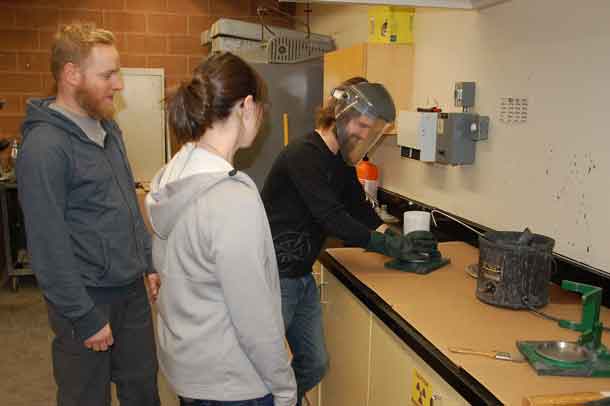Earning a master’s degree is often an important first step towards a successful career in engineering and ensuring a good financial future. Students who are considering applying for a master’s degree in the engineering field should spend some time thoroughly researching the degree programs available in order to find the right fit for them. Once the initial research is completed, you should spend some time understanding the admissions process for the various programs that you have shortlisted. Determine how to apply in a way that puts you in with the best chance of acceptance – after all, moving forward won’t be possible until your place to study has been offered.
Engineering, in particular, can be quite a competitive field to get into for a master’s degree, so it’s important to determine exactly what the school or schools that you’re applying to are looking for. Carefully study the application process to determine what you need to do and maximize the range of opportunities that will become available to you.
If you’re thinking of furthering your career in engineering with a master’s qualification, these tips should help you along the way.
Consider How You’d Like to Study
First of all, you should consider how you’d like to obtain your master’s degree. These days, there are more options than bricks-and-mortar colleges. Online programs in engineering are becoming extremely popular. You can choose from:
- Traditional, campus-based classes at a brick-and-mortar college or university.
- Online-only programs allow you to be more flexible with your studies and are the ideal choice for engineers who wish to continue working full-time as they gain a master’s degree and want to fit education around current working hours easily. (For more information, check the following link: https://online.kettering.edu/programs/masters/electrical-computer-engineering-masters-online)
- Hybrid programs: These combine both online and classroom learning; you can choose which classes to take online and which to take in the classroom. In some cases, you may be able to choose from either option for each class. It’s a flexible approach for anybody who wants the freedom of learning online but also enjoys having the option of learning in the traditional way too.
- Employer-led programs: Speak to your employer before you start applying; many companies offer programs and training options for engineers that may include a master’s degree. Even if your employer does not offer such a program, it’s always worth letting them know your plans as they may offer a tuition reimbursement program that you can take advantage of.
Submit Several Applications
Even if you have a dream school and dream program in mind, submitting only one application for your engineering master’s degree is a mistake. Many students make it; they assume that they will be easily admitted into their school or program of choice. But the unfortunate reality is that it doesn’t always work this way. You might get lucky, but the fact is that most programs will only admit a small percentage of applicants – even those with outstanding grades and relevant industry experience can be denied in some cases. This is especially true if you are applying for a highly competitive program that tends to get more applicants than it has spaces to fill.
- Research programs and shortlist at least 3-6 that you would like to apply to
- Read the application guidelines and entry requirements for each one so that you can tailor your application to showcase the skills, knowledge, and experience that you have in regard to what each individual program is looking for
- Remember that even if you are set on a certain school or program, most schools allow for student transfers, so you may always be able to change to your first choice in the future if you take the second option
Showcase Your Strengths
Once you have determined the way you’d like to study and the programs you’re going to apply for, it’s time to work on tailoring those applications to show off your best side and appeal to the admissions officers. Bear in mind that schools receive thousands of applications from students who have good grades; your grades alone aren’t going to be enough to make you stand out.
It’s important that you take advantage of any available opportunities to differentiate yourself from your competition by showcasing your personal and professional strengths. If there’s the option to submit your resume alongside your admissions essay, it’s definitely worth doing, as this allows the school to get a closer look at what you’ve been doing during your engineering career so far, the employers who’ve hired you and the kind of skills that you’ve developed.
- Take advantage of any opportunity to mention the skills that your employment and past education have helped you gain
- Demonstrate these skills; give specific examples of where you have used them, why you used them, and what the outcome was
- Mention any extracurricular activities that you’ve been involved in or membership of professional bodies and how this has helped you develop your skills further as an engineer
- Don’t forget soft skills; these are important in every industry and it’s likely that your engineering career so far has helped you improve yours and gain a few new ones.
Request an Interview
Admissions interviews are not as common as they once were. More and more schools are judging students based on their application alone and skipping the interview process completely. You may or may not be offered a face-to-face meeting with admissions officers depending on the school that you have applied to.
While this may be a relief to students who get nervous in interviews, it’s not always good news. If admissions officers never get the chance to meet with you in person, you’re not going to be treated as anything more than a statistic. If you’re not offered an interview, it’s worth requesting one. A successful admissions interview can help you stand out to admissions staff and showcase your strengths and personality in a way that simply can’t be done in writing. It can help a seemingly average student shine and get through the rigorous admissions requirements at many universities.
Tips for Your Admissions Interview:
As a prospective master’s student, you may be no stranger to the admissions interview process. But at this level of education, you’ll be expected to perform better than ever; the mistakes you made as an undergraduate applicant might not wash any more. It’s always a good idea to refresh your memory of some college interview best practices:
- Know why you want to attend that college and study for that specific program. This is important if you get an admissions interview for a school that was not your first choice. You may have spent all your time and effort researching your first choice, only for your second or third choice to offer you an interview first. Make sure that you have answers ready for questions like ‘why do you want to attend this college?’
- Research the college and use what you’ve learned during the interview to demonstrate what you know and why you feel that it is the right fit for you.
- Be prepared for some non-academic questions: College admissions interviews aren’t just about discussing your academic achievements – chances are, the admissions officer already knows this from your application anyway. Be prepared to answer some questions about yourself, such as what your strengths and weaknesses are, or even what you enjoy doing as a hobby. This helps admissions staff to get to know you better as a person, rather than simply an applicant.
- Give examples: Go one step further when asked about your strengths and weaknesses; don’t just stare them and leave it at that. Talk about how you have used your strengths to overcome something or get results and mention the strategies that you have in place to deal with your weaknesses and improve on them.
- Prepare for broader questions; it’s not uncommon for interviews to ask broader questions or ask for your opinion on hot topics in the news. Remember that there are no right or wrong answers here; they’re looking to find out more about you as a person. Stay prepared by getting up-to-date on current events and news, and figuring out how to best put your strong opinions, if you have any, across.
Perfect Your Admissions Essay
Reading through a stack of application essays is a job that admissions officers usually dread. Many prospective students ignore careless mistakes that make it difficult to read and some will submit rushed essays that instantly make them stand out for all the wrong reasons. As a result, spending time getting your admissions essay absolutely perfect can make you stand out for the exact opposite.
- There’s usually the option to submit your application online; you should always take this option as it’s easier for both you and the school. Plus, you don’t want to be seen as being behind the times sending mail if you’re applying for an engineering master.
- Consider that schools used advanced analytics software to observe how your application was submitted; if you rush it or plagiarize, they will know about it.
- Use a simple spelling and grammar check tool like Grammarly to make sure that your essay is correct and reads well.
Studying for a master’s degree is a natural next step for most engineers. If you’re considering furthering your career with this qualification, getting prepared for the application program is key to success.



